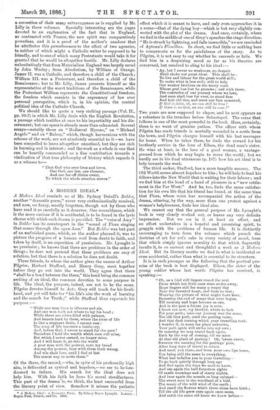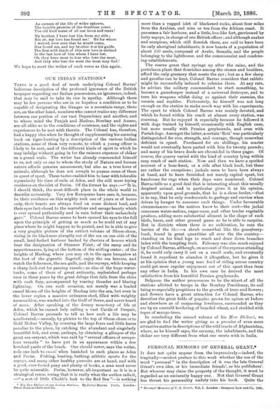A MODERN IDEAL.* A Modern Ideal reminds us of Mr.
Sydney Dobell's Balder, another " dramatic poem," never very enthusiastically received, and now, we fancy, mostly forgotten, though not by those who have read it as carefully as it deserves. One resemblance, which is the more curious if it is accidental, is to be found in the lyric chorus with which each drama is provided. The "voice of Amy" in Balder has its counterpart in the " sound of Flora singing that comes through the open door." But Balder was but part of an unfinished poem, which, as the author planned it, was to picture the progress of a human soul from doubt to faith, and taken by itself, is an exposition of pessimism. Mr. Lysaght is no pessimist ; he knows that there are problems in the order of things ; he does not pretend that these problems are easy of solution, but that there is a solution he does not doubt.
Three friends, to whom the author gives the names of Arthur Pilgrim, Herbert Stafford, and Henry Grey, meet together before they go out into the world. They agree that there "shall be a bond between the three," this bond being the common seeking of an ideal, the common devotion to some purpose in life. The ideal, the purpose, indeed, are not to be the same.
Pilgrim devotes himself to Art ; Grey will teach for his liveli- hood, and yet will take for " his life's aim the work of learning and the search for Truth ;" while Stafford thus expounds his purpose
While one man lives in idleness and sin, And one man bath not where to lay his head ; While there are cities filled with palaces, And haunts bard by them, where the river of life Is like a stagnant drain, I cannot rest : The song of life becomes a battle-ory, And, before God, I swear to stand for the poor ! Therefore I hold the wealth which men call mine,
But which I never earned, no longer mine. And I will leave it, go into the world A poor man with the poorest, earn my bread Among the poorest, bear with them their wrong,
And win their love, until I find at last The truest way to serve them."
Of the three, the second,—who, in spite of his professedly high aim, is delineated as cynical and hopeless,—we see to be fore-
doomed to failure. His search for the ideal does not help him. With his faith he loses his moral steadfastness. This part of the drama-is, we think, the least successful from the literary point of view. Somehow it misses the pathetic • A Modern Idea?: a Dramatic P3em. By Sidney Royce Lysaght. London : Regan Pant, Trend), and Co. 1886.
effect which it is meant to have, and only even approaches it in a scene—that of the dying boy—which is but very slightly con- nected with the plot of the drama. And once, certainly, where we find in the middle of one of Grey's speeches the stage direction, " He is struck by lightning, and falls insensible," we are reminded of Aytoun's Pirmilian. In short, we find little or nothing here to compensate us for the painfulness of the story. As to Pilgrim, it is not easy to say whether be succeeds or fails. We find him in a despairing mood as far as his theories are concerned, but resolved to cling to his ideal :—
" Ay, but I swear no weakness, no despair
Shall shake our great ideal. This shall be : To live and labour for the great world still ; To make what is less evil; still to help Onr weaker brothers on the weary road, Whose goal has lost its promise; and with those, The comrades of our journey whom we love, And soon shall lose for ever, to stand firm And knit old ties, and meet our fate unmoved, If God is false, oh, we can still be true !
If there is no God, we can hall be men !"
Two years are now supposed to elapse, and he next appears as a volunteer in the trenches before Sebastopol. The scene that follows is one of the most powerful in the book. Here, certainly, there is no want of genuine pathos. The officer with whom Pilgrim has made friends is mortally wounded in a sortie from the town, and Pilgrim charges himself with his last messages for home. When he takes them, he finds the reward for his brotherly service in the love of Eileen, the dead man's sister.
He wins at least, in the love of a good woman, a vantage- ground from which he may begin to move the world ; but we hardly see in his final utterances (p. 167) how his art ideal is to help towards the work.
The third seeker, Stafford, has a more tangible success. The Old World seems almost hopeless to him ; he will help to lead his fellows into the New World that is waiting for their labour ; and we find him at the head of a band of pioneers in a " new settle- ment in the Far West." And he, too, finds the same satisfac- tion for his own life that his friend has found, at the same time that Flora, whose voice has accompanied the action of the drama, uttering, by the way, more than one protest against a woman's helplessness, finds her ideal also.
We cannot say that the general purpose of Mr. Lysaght's book is very clearly worked out, or leaves any very definite impression. But we see in it at least an effort, and an effort undertaken in a hopeful and promising spirit, to grapple with the problems of human life. It is distinctly encouraging to turn from the volumes which preach the doctrine of art for art's sake in every variety of mood, from that which simply ignores morality to that which flagrantly insults it, to so earnest and thoughtful a work as A Modern Ideal. But its literary merits we find in what is incidental or even accidental, rather than what is essential to its structure. It is in such passages as the following that the poetical pro- mise of the book is best displayed. Eileen, the sister of the young soldier whose last words Pilgrim has received, is speaking :—
" Oh, as a bird still lingers round the nest
From which her little ones were stolen away, Hope lingers still for many a weary day Near the deserted heart, and finds no rest ; Weaving the picture of what might have been, Dreaming the end of songs that were begun, Till memory and hope become as one, And in the past a future joy is seen.
I know not now, my brother, where to look
For your path; once our journey was the same,
The old dear path, until the parting came, And that dark turning which your travelling took_ I wonder if, in some far place unknown, Your path again will strike into my own ; Or someday we may travel back again, Each by the way of coming, till we meet At that old place of parting ? Oh, 'twere sweet, Sweeter the meeting for the partings' pain, After long days of travel to return And meet you there, and from your own lips learn,.
You being still the same in everything,
What had befallen you in your travelling—
To go back quietly through long ago
And find again the days we used to know,
Aud see again the half-forgotten sights Of sunlit mornings and of starry nights,
And hear again the sounds so long unheard—
The sweet note in the woodland of a bird, The music of the wild wind of the earth ; And smell the flowers which there alone have birth ; Till the uld life grew ours again once more, And earth the same old home we knew before- An earnest of the life of wider spheres, The humble promise of the deathless years, The old kind nurse of all our loves and tears !
My brother, I have lost him from my side ; But oh, my love has found me! He for whom I waited, ever sure that be would come, Has found me, and my brother was his guide. The first wild throb of this new love is shrined In the last love of him whom I have lost. Oh, they have most to lose who love the most, And they who lose the moat the most may Sod !
We hope to meet the writer of such verse as this again.



































 Previous page
Previous page